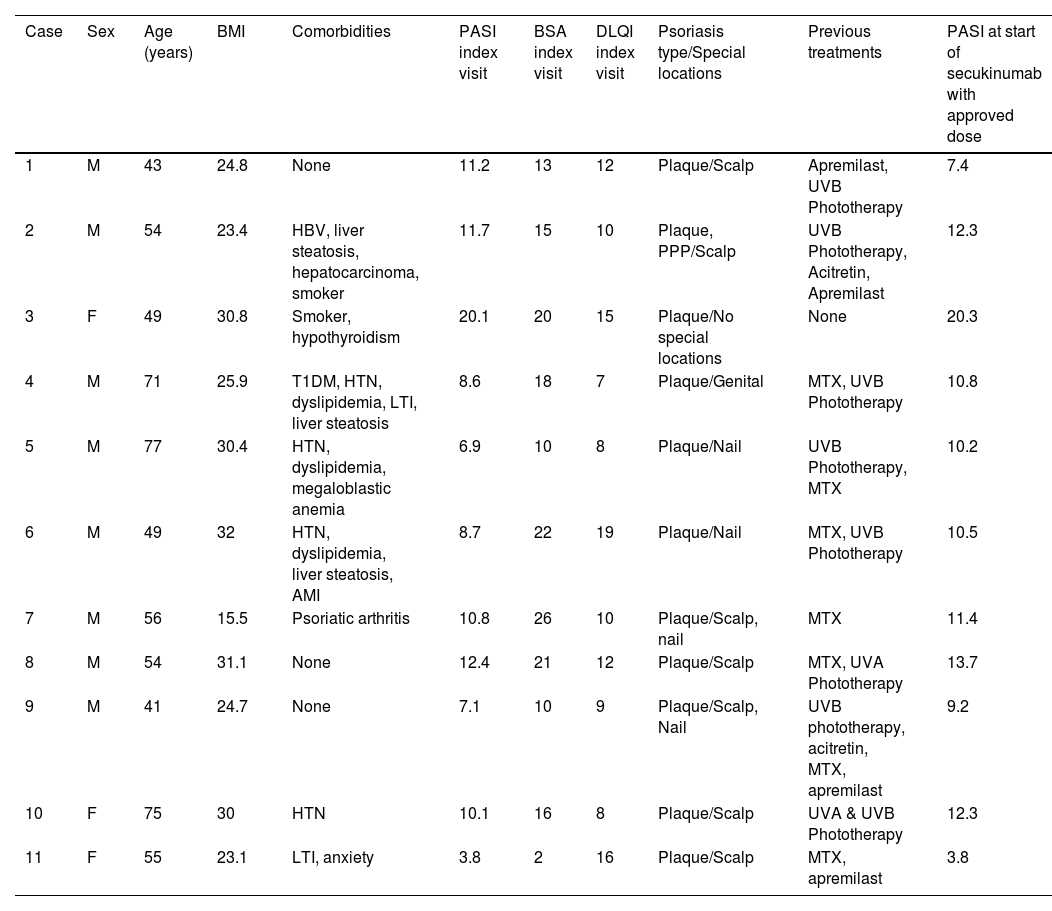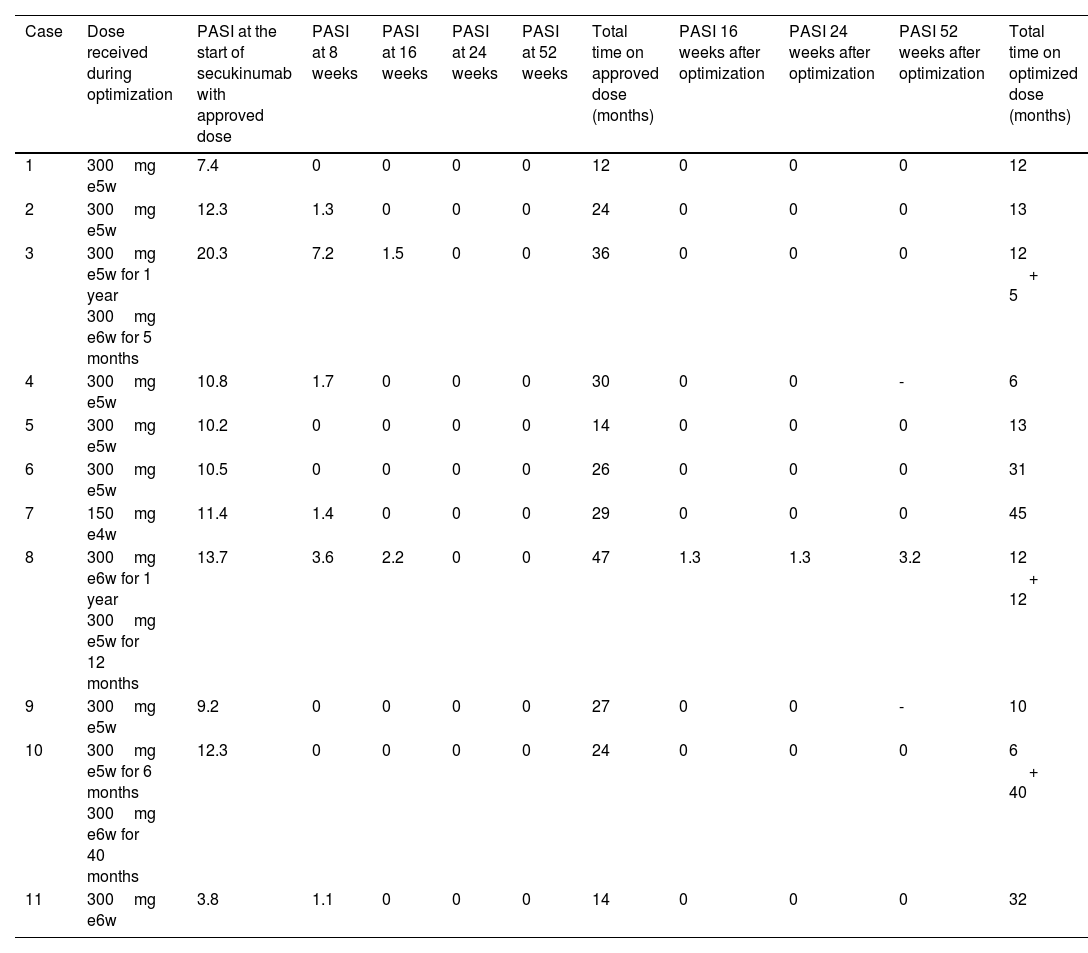Since the implementation of biological therapies for the treatment of psoriasis, the therapeutic paradigm has changed, especially since the approval of anti-IL-17 and anti-IL-23 targeted therapies, due to their greater effectiveness.1,2
The latest published expert consensuses consider new therapeutic goals, differentiating between the optimal goal and the clinically adequate goal,3 and propose absolute PASI as the most useful measure, avoiding the use of relative PASI due, mostly, to the high percentage of patients who currently achieve a PASI 0 response. In these patients, there is also the possibility of dose optimization,4–6 either by down-titration or by increasing the time interval between doses. This further individualizes treatment, improving the safety and cost-effectiveness profile of these therapies, which are considered to have a high economic impact. Up-titration is also considered for patients with an insufficient response.
On the other hand, there is disagreement about the appropriate time to perform dose optimization, both in the published literature and in the routine clinical practice. A Delphi Consensus7 was published, proposing the ideal time for treatment optimization when the patient has reached ≥ 6 months of treatment and ≥ 6 months of low disease activity (PASI ≤ 5 and/or PGA 0-2 and DLQI ≤ 5), except for patients with concomitant psoriatic arthritis, in whom the decision must be made along with a rheumatologist.
This consensus excluded new biological therapies targeting IL-17 and IL-23 due to the lack of existing evidence. A clinical trial is being conducted on these treatments to evaluate disease activity after down-titration.8
Secukinumab is a monoclonal antibody targeting IL-17A, with an approved maintenance dose of 300mg every 4 weeks as per the technical data sheet.9
We conducted a retrospective, single-center observational study, reviewing all patients treated with secukinumab at Hospital Universitario Doctor Peset, Valencia, Spain from January 2015 through January 2023. Patients who received an optimized dose were included in the study, with the goal of reporting our clinical experience after dose optimization.
Dose optimization was performed in patients who achieved a PASI 0 and maintained it for, at least, 52 weeks from the start of treatment, with no fluctuations in disease activity during recent follow-up visits.
Initial demographic characteristics and disease severity indices from the index visit, including PASI, Body Surface Area (BSA), and Dermatology Life Quality Index (DLQI), were recorded. The progression of disease severity—as measured by PASI—was evaluated at the start of secukinumab at the usual dose, 8, 16, 24, and 52 weeks after starting therapy, when transitioning to the optimized dose, and 16, 24, and 52 weeks after optimization.
The criterion for successful optimization was based on Llamas-Velasco and Daudén's4 proposal in other biological therapies and focused on the persistence of the optimized treatment strategy 6 months after changing the dose.
A total of 86 patients who had received secukinumab at our center were identified (63 are still on active treatment), 12 of whom received an optimized dose. One patient was excluded from the study due to his participation in the OPTIMISE trial.
The epidemiological characteristics, severity, and follow-up times are shown in Tables 1 and 2.
Demographic and clinical characteristics at the index visit and at the start of secukinumab with approved dosing.
| Case | Sex | Age (years) | BMI | Comorbidities | PASI index visit | BSA index visit | DLQI index visit | Psoriasis type/Special locations | Previous treatments | PASI at start of secukinumab with approved dose |
|---|---|---|---|---|---|---|---|---|---|---|
| 1 | M | 43 | 24.8 | None | 11.2 | 13 | 12 | Plaque/Scalp | Apremilast, UVB Phototherapy | 7.4 |
| 2 | M | 54 | 23.4 | HBV, liver steatosis, hepatocarcinoma, smoker | 11.7 | 15 | 10 | Plaque, PPP/Scalp | UVB Phototherapy, Acitretin, Apremilast | 12.3 |
| 3 | F | 49 | 30.8 | Smoker, hypothyroidism | 20.1 | 20 | 15 | Plaque/No special locations | None | 20.3 |
| 4 | M | 71 | 25.9 | T1DM, HTN, dyslipidemia, LTI, liver steatosis | 8.6 | 18 | 7 | Plaque/Genital | MTX, UVB Phototherapy | 10.8 |
| 5 | M | 77 | 30.4 | HTN, dyslipidemia, megaloblastic anemia | 6.9 | 10 | 8 | Plaque/Nail | UVB Phototherapy, MTX | 10.2 |
| 6 | M | 49 | 32 | HTN, dyslipidemia, liver steatosis, AMI | 8.7 | 22 | 19 | Plaque/Nail | MTX, UVB Phototherapy | 10.5 |
| 7 | M | 56 | 15.5 | Psoriatic arthritis | 10.8 | 26 | 10 | Plaque/Scalp, nail | MTX | 11.4 |
| 8 | M | 54 | 31.1 | None | 12.4 | 21 | 12 | Plaque/Scalp | MTX, UVA Phototherapy | 13.7 |
| 9 | M | 41 | 24.7 | None | 7.1 | 10 | 9 | Plaque/Scalp, Nail | UVB phototherapy, acitretin, MTX, apremilast | 9.2 |
| 10 | F | 75 | 30 | HTN | 10.1 | 16 | 8 | Plaque/Scalp | UVA & UVB Phototherapy | 12.3 |
| 11 | F | 55 | 23.1 | LTI, anxiety | 3.8 | 2 | 16 | Plaque/Scalp | MTX, apremilast | 3.8 |
BSA: Body Surface Area; DLQI: Dermatology Life Quality Index; T1DM: type 1 diabetes mellitus; F: female; HBV: hepatitis B virus; M: male; MTX: methotrexate; PASI: Psoriasis Area and Severity Index; PPP: palmoplantar pustular psoriasis; UVA: ultraviolet A; UVB: ultraviolet B; LTI: latent tuberculosis infection; HTN: hypertension; AMI: acute myocardial infarction.
Mean follow-up time and maintenance of optimized dose, and mean severity indices at the index visit, and mean PASI before starting secukinumab (n=11).
| Mean follow-up time | 90.54 months [43-126] |
|---|---|
| Number of patients with different optimization strategies: | |
| 300mg every 5 weeks | 7 |
| 300mg every 6 weeks | 3 |
| 150mg every 4 weeks | 1 |
| *The only patient optimized to 150mg every 4 weeks had an extremely low BMI of 15.8 | |
| Mean time maintaining the optimized dose | 22.6 months [6-46] |
| Mean BMI | 26.5 |
| Mean BSA at the index visit | 15.7 |
| Mean PASI at the index visit | 10.1 |
| Mean DLQI at the index visit | 11.45 |
| Mean PASI at the start of secukinumab | 11.2 |
BSA: Body Surface Area; DLQI: Dermatology Life Quality Index; BMI: body mass index; PASI: Psoriasis Area Severity Index.
The optimized dose received in each case and the clinical progression of PASI before and during dose optimization are shown in Table 3.
Clinical progression with secukinumab receiving approved maintenance dose per data sheet and optimized dose. The dose received by each patient is also described.
| Case | Dose received during optimization | PASI at the start of secukinumab with approved dose | PASI at 8 weeks | PASI at 16 weeks | PASI at 24 weeks | PASI at 52 weeks | Total time on approved dose (months) | PASI 16 weeks after optimization | PASI 24 weeks after optimization | PASI 52 weeks after optimization | Total time on optimized dose (months) |
|---|---|---|---|---|---|---|---|---|---|---|---|
| 1 | 300mg e5w | 7.4 | 0 | 0 | 0 | 0 | 12 | 0 | 0 | 0 | 12 |
| 2 | 300mg e5w | 12.3 | 1.3 | 0 | 0 | 0 | 24 | 0 | 0 | 0 | 13 |
| 3 | 300mg e5w for 1 year 300mg e6w for 5 months | 20.3 | 7.2 | 1.5 | 0 | 0 | 36 | 0 | 0 | 0 | 12 + 5 |
| 4 | 300mg e5w | 10.8 | 1.7 | 0 | 0 | 0 | 30 | 0 | 0 | - | 6 |
| 5 | 300mg e5w | 10.2 | 0 | 0 | 0 | 0 | 14 | 0 | 0 | 0 | 13 |
| 6 | 300mg e5w | 10.5 | 0 | 0 | 0 | 0 | 26 | 0 | 0 | 0 | 31 |
| 7 | 150mg e4w | 11.4 | 1.4 | 0 | 0 | 0 | 29 | 0 | 0 | 0 | 45 |
| 8 | 300mg e6w for 1 year 300mg e5w for 12 months | 13.7 | 3.6 | 2.2 | 0 | 0 | 47 | 1.3 | 1.3 | 3.2 | 12 + 12 |
| 9 | 300mg e5w | 9.2 | 0 | 0 | 0 | 0 | 27 | 0 | 0 | - | 10 |
| 10 | 300mg e5w for 6 months 300mg e6w for 40 months | 12.3 | 0 | 0 | 0 | 0 | 24 | 0 | 0 | 0 | 6 + 40 |
| 11 | 300mg e6w | 3.8 | 1.1 | 0 | 0 | 0 | 14 | 0 | 0 | 0 | 32 |
E4w: every 4 weeks; e5w: every 5 weeks; e6w: every 6 weeks; PASI: Psoriasis Area Severity Index; w: weeks.
In our series, 2 patients have not yet completed 52 weeks of follow-up after optimization. All patients achieved therapeutic success with dose optimization based on the proposed criterion.
Reports from the routine clinical practice on dose optimization with anti-TNF drugs and ustekinumab4–6 confirm the effectiveness of these dosing strategies. It is necessary to carefully select candidates, considering variables such as disease duration, prior persistence with the same biological therapy, the presence of psoriatic arthritis, body mass index (BMI), or previous use of other biological therapies.
Recently, the OPTIMISE trial evaluated the safety and efficacy profile of different doses of secukinumab during the maintenance phase to demonstrate that these doses were not inferior to the recommended dose. In this study, a worse response was observed in patients on secukinumab 300mg every 6 weeks (assessed by PASI 90) at week 52.10
These results contrast with our clinical experience. Except for 1 case that maintained a mean PASI of 1.9 within the first 52 weeks after optimization, all patients maintained not only a relative PASI 90 response but a PASI 0 response.
The mean BMI in both populations was similar (26.5 in our series, 28.5 in the OPTIMISE trial), and both series only included patients naïve to biological therapy.
Although the populations differ in the mean initial PASI value—higher in the OPTIMISE study—this is a common finding when comparing clinical trial populations with those from the routine clinical practice.
As a distinguishing factor, in our series, all patients maintained a complete treatment response for, at least, 52 weeks, unlike the OPTIMISE trial, which considered dose optimization at 24 weeks in patients with a PASI 90 response. The choice of stricter disease control criteria, both in terms of prior drug exposure time—a minimum of 52 instead of 24 weeks—and clinical efficacy—PASI 0 instead of relative PASI 90—may be key in explaining the differences observed in the response following optimization.
In conclusion, in our experience, dose optimization of secukinumab in patients with persistent complete clearance after, at least, 52 weeks after starting treatment is a good dosing alternative, as we achieved a maintained PASI 0 response in 10 out of 11 patients from our series for, at least, 6 months. These selected patients had a BMI between 25 and 30, were naïve to biological therapy, and down-titration also improved the cost-effectiveness ratio of secukinumab treatment.
Larger sample size studies are needed to determine whether these variables are associated with statistically significant good sustained responses after dose optimization. Furthermore, comparative studies are needed to evaluate whether the use of stricter optimization criteria, as in our series, is associated with better responses after dose optimization.
Authors’ contributionsAll authors contributed intellectually to the manuscript, met the authorship criteria, and approved the manuscript final version.
FundingNone declared.
Conflicts of interestNone declared.








